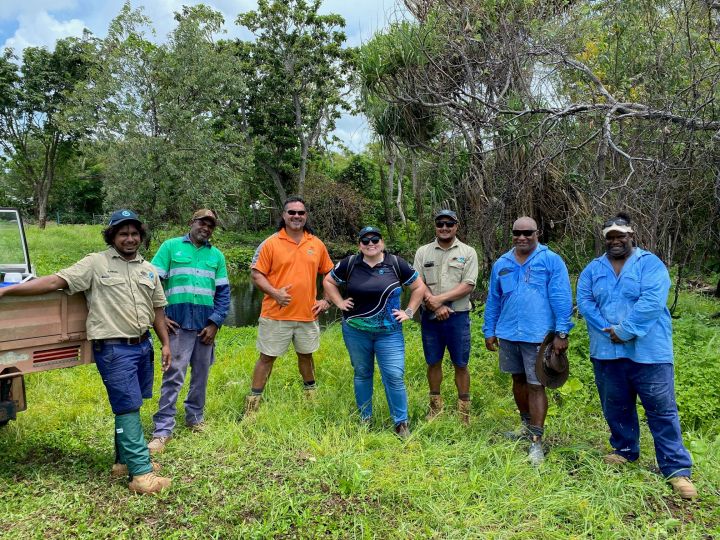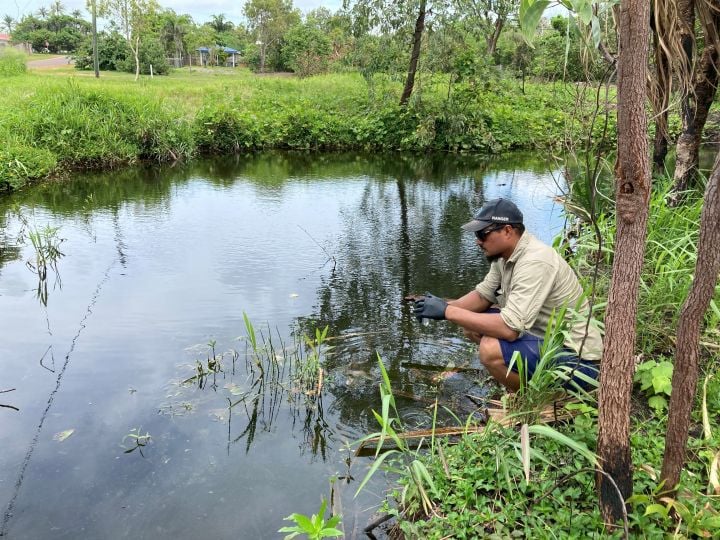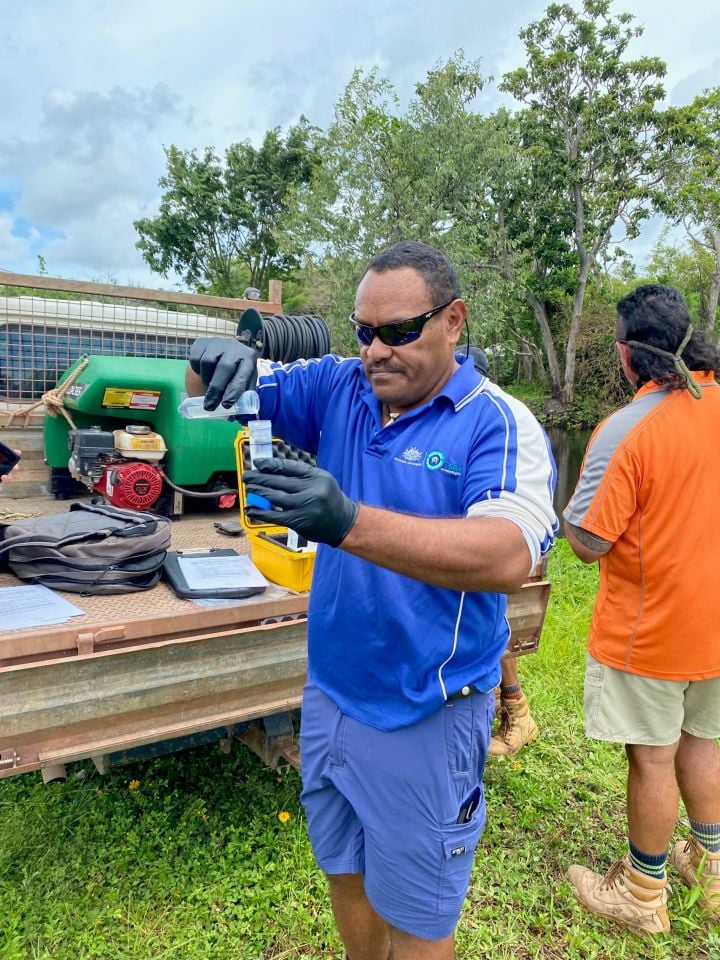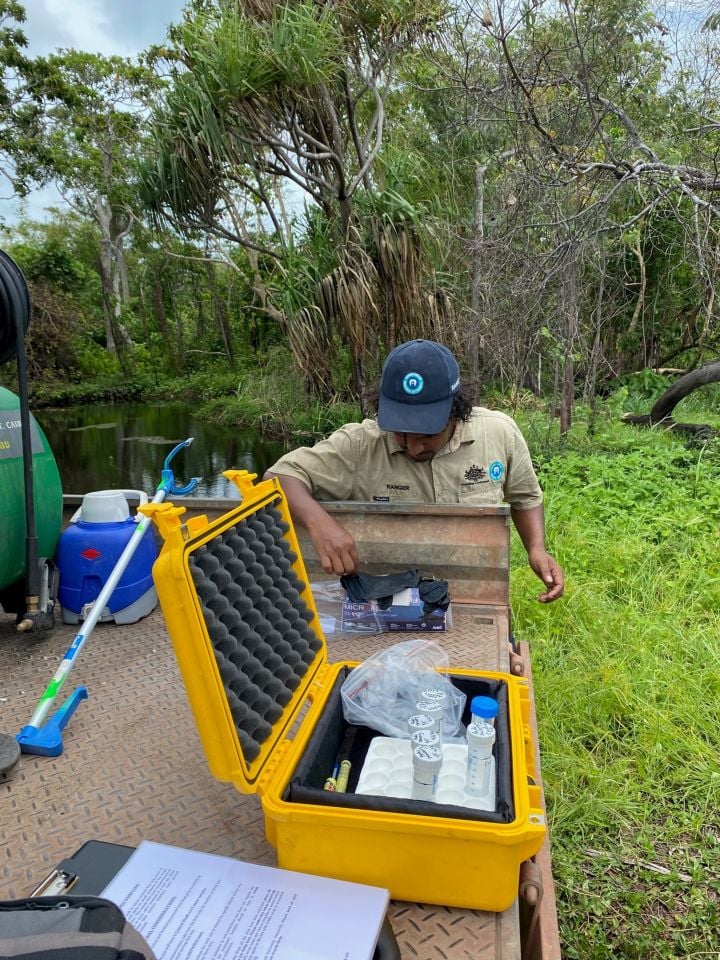
TSRA Rangers are using science to stop the spread of cane toads to pristine islands in the nation’s far north.
Cane toads are already established on Waiben (Thursday Island), Ngurapai (Horn Island) and are also found in Bamaga and Seisia in the Northern Peninsula Area of mainland Australia.
The Torres Strait outer islands are among few Queensland locations that are still cane toad-free. These four-legged hitchhikers cannot reach the islands unassisted, instead hiding in boats, cargo and vessels as people travel from the mainland, where cane toad populations are established.
The uninvited visitors can harm local wildlife including fish, reptiles and birds if swallowed. This poses an immense threat to the cultural ecosystems and ways of life for Torres Strait Islander communities.
Cane toads can lay up to 30,000 eggs at a time and even tiny tadpoles can carry enough toxins to harm water and shore birds feeding in freshwater wetlands. Cane toads are not only toxic to their predators, but are also aggressive competitors, often displacing native fauna species from their preferred habitat.
TSRA Rangers across the region are now learning to use environmental DNA (eDNA) sampling to check freshwater bodies in a bid to detect toads early and take action.
TSRA Rangers will use special eDNA kits to test for and collect genetic material, such as skin cells, faeces and bodily fluids left behind by animals, which is then lab-processed by JCU TropWATER to help determine if cane toads are present.
TSRA Chairperson Napau Pedro Stephen AM said the rangers would help boost local, state and federal biosecurity and biodiversity conservation efforts against cane toads and other pests in remote communities.
“Cane toads were first officially recorded in the Torres Strait in the 2000s and continue to impact local wildlife, particularly during Kuki / Koki (wet) season,” Mr Stephen said.
“The strong northwest winds and heavy rain is a boom time for cane toads on Waiben (Thursday Island) and Ngurapai (Horn Island).
“We urge all visitors and residents arriving from the mainland and inner islands to check your baggage and dinghy and for tadpoles or baby toads.
“There are no official reports of established cane toad populations on any outer islands, please help us keep our beautiful islands cane toad-free,” he said.
Senior TSRA Mura Badhulgau Ranger Laurie Nona said cane toads posed threats to natural and cultural heritage, including the traditional headdress known as Dhari / Dhoeri, which is synonymous with Torres Strait Islander culture and features on the flag.
“Karbai (Great Egret) provide the most pure white feathers for making Dhoeri,” Mr Nona said.
“If cane toads established on Badu, we could lose the Karbai, forever severing ties to our ancestors’ traditional ways of making the Dhoeri using Karbai feathers.”
Remember to check your load. Don’t carry a toad! Report any cane toad sightings to your local TSRA Rangers or Biosecurity Queensland.
About TSRA
This year, TSRA celebrates its 30th Anniversary and the resilience, achievements and aspirations of the region.
Established on 1 July 1994, TSRA is a statutory body and the lead Commonwealth agency in the Torres Strait for Indigenous Affairs, operating under the direction of an elected Torres Strait Islander and Aboriginal Board.
As one of the most remote Australian Public Service agencies, TSRA supports programs across the Torres Strait region, including for the 17 inhabited islands of the Torres Strait and the communities of Bamaga and Seisia in the Northern Peninsula Area of mainland Australia.
The Torres Strait stretches 150 kilometres northwards from Cape York Peninsula to Papua New Guinea. The 48,000 km² area includes more than 270 islands and reefs.
TSRA’s Environmental Management Program – delivered by the Land and Sea Management Unit –aims to protect the ecological complexity and biodiversity of the Torres Strait region, and the strong and enduring connection of people to their islands and sea.
This program supports job opportunities for local people to combine traditional knowledge and Western science to care for land, sea and culture, including as rangers. The TSRA Rangers started in 2009 with one ranger group on Mabuiag and has grown to 13 Ranger groups across 14 Torres Strait communities (13 islands) – supporting 55 ranger roles, including 18 female rangers.




